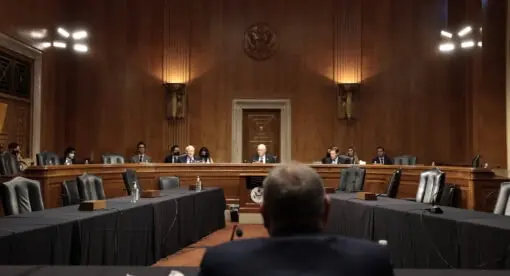In the latest Contours episode, host Carolyn Moorman, New Lines Director Caroline Rose and Syria expert Salma Daodi approach the steps multiple Arab countries are taking toward political normalization with the Assad regime and how this affects the spheres of illicit economies and public health.
Carolyn Moorman:
Hello, and welcome to the Contours Podcast by the New Lines Institute for Strategy and Policy. This is your host, Carolyn Moorman, and today we’ll be diving into a topic that we’ve discussed many a times on Contours, which is Syria and the Assad regime’s quest for normalization with the international community. Normalization is a complex issue that touches multiple different angles, and we’ll be discussing two of those today, illicit economies, specifically Captigon, and public health, with two experts. The first is Caroline Rose. Caroline is the director of the Strategic Blind Spots Portfolio at the New Lines Institute, where she leads and produces research on the intersection of defense, security, illicit trades and geopolitical landscapes from Europe to the Middle East and North Africa. Her portfolio at the New Lines Institute includes two projects, the project on the Captagon trade, and the project on post withdrawal security landscapes.
Previously at the New Lines Institute, Rose served as the head of the power vacuums program. As of fall 2023, she’s also an adjunct assistant professor at Georgetown University’s Edmund A. Walsh School of Foreign Service, teaching a graduate course on the nexus of illicit economies, armed conflict and insecurity. Also, joining us is Salma Daoudi. Salma is a researcher and doctor of philosophy candidate in international relations at the University of Oxford, specializing in international security and global health with a focus on the Middle East and North Africa. Her research primarily revolves around the weaponization of health in Syria and the politicization of humanitarian aid. Previously as a researcher and policy analyst, she focused on human insecurity and asymmetric warfare, the security-development nexus and MENA geopolitics.
Thank you both for being here. I’d like to start with you, Caroline, and kind of take us back to when you last appeared on the podcast, which was May. You spoke to us about how the Assad regime has a tendency to say one thing and do another thing when it comes to Captagon, as it of course remains the largest producer and distributor of the drug throughout the region. You also mentioned that the trade at that time had adapted to new routes through Turkey and Jordan. And I’m wondering in these past couple of months if you’ve seen any new trends that you can tell us about.
Caroline Rose:
Certainly. So we’ve been looking at a database that captures a lot of these trends and these patterns in the Captagon trade, and what we’ve seen, a number of different trends. One of course, is the fact that there’s been a severe uptick in overland smuggling of Captagon, particularly along the Syrian-Jordanian border, but then also a notable uptick in Captagon seizures, as well as laboratory seizures in Iraq, which indicates the potential expansion of the Captagon trade deep into Iraq, not only through smuggling, but also production capacity. There was a laboratory seizure this past July along the Iraqi and Saudi border that was very notable that shows that traffickers are trying to increase manufacturing capacity closer to destination markets in the Gulf. So we definitely are starting to see this expansion of Captagon in the region.
Another concerning trend that we saw over this past summer has been production capacity increasing in Europe, the European Monitoring Center for Drugs and Drug Addiction, an EU agency that’s focusing on illicit substances and drugs, they recently released a report that captures new production trends deep into European territory, particularly in the Netherlands, and they noted that there was production found in the Netherlands of Captagon. And additionally, there was a German laboratory bust that was conducted in July in Regensburg in Bavaria, in addition to a warehouse of Captagon that also indicated that these networks emanating from Syria and Lebanon were trying to set up shop in European countries, which is definitely concerning and shows that the Captagon trade is incrementally expanding beyond Syria and the Levant.
Carolyn Moorman:
You’ve outlined that the trade is not only starting to be produced in other countries, but it’s still very happily spreading throughout the region. The Assad regime is a central node in that supply chain. And so, I’m wondering in your eyes, Caroline, why so many Arab countries seem to be considering normalization in the first place. They obviously know that this is a problem. We’ve seen this come up in a lot of the diplomatic outreach that has been happening with the Assad regime is this topic of Captagon. So are they hoping that better relations with Damascus is going to fix things? And for the countries that have begun to walk towards normalization on this spectrum, are they seeing any positive growth out of the regime in limiting Captagon flows, or is it just all talk?
Caroline Rose:
Yeah, I think in this past spring we saw many regional partners and neighbors of Syria try and put all of their eggs in the basket of normalization, hoping that this would lead to a more proactive and effective counter-narcotics campaign and strategy in the region. There was this belief that if you dealt with the Assad regime directly because they have the agency over the Captagon trade, that it would inevitably lead to a reduction in direct flows from Syria into these destination markets. We saw working groups established between, for example, Syria, Jordan and Iraq that were tasked to investigate the sources of smuggling as well as collaborate on ways to reduce smuggling activities. We saw sometimes some direct Jordanian strikes into Syrian territory that were targeting these traffickers. And then in addition to that, we also saw reports that some countries were even considering financial concessions and financial packages to incentivize the regime to turn a cheek away from the Captagon trade.
However, that strategy does not seem to be effective. We’ve seen a very severe uptick in Captagon seizures in the Gulf throughout the summer, despite attempts to negotiate with the Assad regime over the Captagon trade. In addition to that, the violent smuggling incidents and clashes along the Syrian-Jordanian border have continued, the level of Captagon that has flowed into Jordanian borders. That has also continued. We really have not seen a significant downturn in the flow of Captagon in the region and have even seen Captagon start to stem outside of the region in Europe and in North Africa as well. So because of that, I think that there is now an understanding that normalization may not be the ticket to reducing the influence and the prevalence of the Captagon trade in the Middle East. And as a result, I think that we’re likely going to see countries incrementally embark on their own counter-narcotics campaigns without the Syrian regime and reduced trust levels with Damascus as a result, given the fact that there really have not been many deliverables from Damascus on Captagon.
Carolyn Moorman:
Absolutely. And now that we’ve laid the groundwork for the illicit economy side, I’d like to turn now to public health and Salma and the report that you wrote for New Lines this month titled, ‘The Public Health Effects of Normalization With Syria,’ you focused on the regime’s central role in targeting civilian infrastructure and triggering new health vulnerabilities as a deliberate tactic to dissuade people from supporting opposition groups. And I’m wondering if you can go into detail about what this looks like for the average Syrian and how this has affected the Syrian population as a whole.
Salma Daoudi:
First of all, thank you very much for inviting me, Carolyn, to take part in such an important conversation surrounding normalization with the Syrian regime and sort of looking at how it shapes the country’s economic and political trajectory. I think it’s super important to kind of really try to explore the impact that it has had on health and public health since this has been an element that has sort of been neglected in similar discussions. Yet the weaponization of health in Syria has had a catastrophic impact on the health security of the Syrian population, with millions of people affected by deteriorating living conditions, forced displacement and weakening health capacities.
So as you rightfully mentioned in your question, the regime’s response to growing opposition was characterized by a deliberate and systematic targeting of healthcare infrastructure, in addition to the persecution both legal and physical of healthcare personnel. So for instance, between 2011 and 2022, over more than 600 attacks against healthcare facilities have been documented, and over 90% of these have been conducted by the Syrian regime and its allies. So most hospitals, healthcare facilities, have been either destroyed or substantively damaged, with today about less than 60% of the country’s hospitals being actually functional and able to provide care. So this means that when sick or injured, Syrians rarely can receive the adequate and appropriate care, leading to A, medical complications, and B, to a surge of avoidable mortality.
So while several NGOs and civil society organizations are kind of attempting to fill that public health void and provide healthcare services, severe restrictions on aid, especially in areas that are outside of the regime’s control, have hampered kind of the implementation of local crisis medication and containment measures. And so, this is worth noting since while the supply of health services has shrunk, demand for it has been increasing in parallel. So we have over 12 million Syrians today, meaning more than half of the population, who are currently suffering from chronic hunger, which is a main driver obviously of health insecurity. In parallel, the lack of access to clean water is also driving the rapid propagation of diseases.
And so, due to repeated attacks on water systems, less than half of the country’s water and sanitation systems are currently operational, which means that for a large share of Syrians today, they have no other choice but to rely on alternative, untreated water sources. Which obviously as I mentioned earlier, are vectors of a wide range of waterborne diseases. And so, to give a more kind of elaborate picture of what it means today for the average Syrian to be living under such conditions, meaning rising rates of poverty, malnutrition, the lack of critical infrastructure, safe housing, etc, all of these are contributing to a sharp rise of diseases seen recently, diseases such as polio, tuberculosis, cholera, resurging in the country, even though they’ve been previously eradicated. And I think that this really illustrates the extent to which constrained access to quality housing, sufficient food, clean water, and adequate sanitation services really pose a great danger to the physical and psychosocial health of Syrian civilians, and especially those who have been internally displaced.
Carolyn Moorman:
Absolutely, and you’ve clearly done a great job in outlining how much this conflict and the Assad regime’s deliberate tactic of targeting civilian infrastructure and kind of damaging the health fabric of Syria has been affecting these people. And something that we’ve also discussed in previous episodes of Contours is just the Assad regime’s blatant state of corruption and how this has been evident multiple times, most recently in the terrible earthquake that occurred in Syria and Turkey this February, and how a lot of the international community rushed aid very rightfully into Syria, trying to help all of these people that the Assad regime then dealt with in its corrupt fashion.
But of course, a good chunk of the rationale that these Arab countries and other regional countries are using to justify normalizing with the Assad regime is that they would like to send aid into Syria through Damascus and help the Syrian people who have been suffering for so long. And I’m wondering, in your eyes, Salma, in the future as this normalization process continues, how you see the threat of corruption within the regime affecting the health sector?
Salma Daoudi:
I think rebuilding Syria’s public infrastructure and including its health infrastructure is of course undeniably essential to improving the living conditions of Syrians, to ensuring a more stable access to clean water, economic opportunities, healthcare services, food, etc, and possibly even aid. But based on past trends, the selective and politicized reconstruction of the country, which would be allowed kind of through Assad’s rapprochement with regional allies, runs the risk of threatening the human and health security of Syrians in the long run, even while it provides some sort of short-term relief. And so, looking at past trends of reconstruction policies engineered by the regime in the areas it holds or has recently regained control over, allows us to better understand how the reconstruction of Syria’s public health infrastructure might be carried out. So I think it’s really important to look at past trends to be able to kind of protect the future ones.
And reconstruction efforts have so far been not only highly selective geographically, politically, economically prioritizing projects, but also people that are best aligned with the regime’s economic and political interests, oftentimes at the detriment of damaged and impoverished former opposition areas. But also sometimes shifting the responsibility of service provision from the state to the people. There are lots of Syrians today who are paying reconstruction taxes without being able to actually benefit from any sort of repair to their local infrastructure. And so, public health infrastructure and health service provision has similarly been very selectively instrumentalized to benefit military and political security actors all while excluding the general population. Even if healthcare improvement was actually a major promise extended by the regime during reconciliation campaign when attempting to capture formally rebel health territories. And so, public health and as you rightfully also mentioned, has not been spared from corruption, accumulative and monopolistic tendencies.
And the decline in availability and accessibility of health services is then not simply reflective of the lack of infrastructure, but more broadly the deliberate policy of exclusion that conditions access to healthcare, to social, economic and political capital. And so, looking at this picture, it seems that by concentrating all of recovery initiatives in the hands of the Syrian government would prompt the reconstruction of a much more heavily politicized and organizable health sector that is characterized by a lack of equitable access, the exclusion of opposition-held territories, especially northwest Syria, but also the northeast by the diversion of funds to potentially finance further human rights abuses and the solidification of political and socioeconomic health inequalities with obviously greater chances for the spillover of infectious diseases. And this kind of leads to a more technical conversation on the differences between recovery, reconstruction, humanitarian aid.
Obviously recovery efforts are technically more financially sustainable and cost-effective. And it does make sense that for a lot of neighboring countries, the rationale is towards rebuilding and stabilizing Syria as opposed to short-term humanitarian assistance models that fail to really respond to local needs. But the problem with recovery efforts is that they fail to address the political and economic dysfunctions of the state of Syria. And so, it might seem like a simple technicality, but the transition towards technical recovery and reconstruction assistance from humanitarian assistance suggests that Syria has moved past conflictual dynamics and it gives the regime the legitimacy and opportunity to evade sanctions, co-opt relief efforts and request full authority and control over the distribution of funds and aid. And so, to kind of conclude that point, I would just say that it’s important to emphasize that the risks that the Syrian government will continue to prioritize the healthcare needs of its supporters and sideline marginalized populations as it reconstructs Syria is very, very much significant.
And the funds that are intended for healthcare run the risk of being diverted to other sectors or to be used for military purposes. This is something that the regime has historically done by encouraging the militarization of healthcare and prompting military institutions to exercise greater influence on medical institutions. But also that rebuilding Syria’s public health system is heavily contingent upon the possibility to reconstruct its healthcare labor force. But the large exodus of health personnel is actually a consequence of the mass campaigns that were targeting, persecuting and forcibly disappearing health personnel. And so, it seems unlikely that the country’s health labor force can be rebuilt if the root causes of insecurity and political instability are not addressed.
Carolyn Moorman:
Now that we’ve really laid out the framework of the discussion within the public health and the illicit economy’s tracks of the conflict, I’d like to move it into recommendations now. And I am going to put this all in one question and I was thinking Caroline can answer first on the Captagon side and then we’ll turn to Salma. But given all of this, what steps should the US be taking in this normalization process? Turning to you, Caroline, you have outlined in your responses that these countries that are turning towards normalization are not seeing a lot of fruit for their labor, if I can put it that way. And they’re not seeing the regime really do what it says it’s doing with Captagon, and they’re still seeing this supply continue, still seeing this Captagon be a problem throughout the region and in their respective countries. And you also mentioned that it’s showing up in Europe, which is obviously a big problem for the US as European allies.
So I’m wondering if you could talk to us a little bit about how the US is behaving now, what it’s doing now and what it should be doing more in this capacity. And then Salma, you’ve talked about how the current strategy of these regional countries in trying to normalize and trying to help the people of Syria through these recovery efforts are not being used in the best capacity due to the Assad regime’s corruption and that there needs to be a new pathway. So I’m wondering if you could go into detail for us after Caroline, what those pathways should be and how the US can best support the Syrian people without further legitimizing this Assad regime. So we’ll start with you, Caroline.
Caroline Rose:
Certainly. So I think up to this point, the United States is now starting to build an interagency strategy, and a strategy overall with its partners, in countering the Captagon trade, both in the context of Syria, but also within the region and the Mediterranean-Gulf zone. And we’ve seen a number of policy initiatives undertaken, especially in this last year following the passage of the Captagon Act within Congress. We’ve seen sanctions imposed both along with the UK as well as the EU on a series of Captagon traffickers and producers and narco entrepreneurs and criminal organizations that are very heavily embedded within the Captagon trade. For example, Maher al-Assad, the president’s brother, but then also Wassim Badia al-Assad, Somar al-Assad, [foreign language 00:20:05], a few names that were of course targeted by these initiatives. Additionally, the United States is working within the global coalition against synthetic drugs, an initiative that was announced this past summer by the US State Department and by Secretary of State Antony Blinken.
And that definitely is a venue and a framework in which the United States is targeting the Captagon trade in the broader context and under the umbrella of other synthetic drugs. That being said, I think that the United States does risk being behind the curve when it comes to countering Captagon, in the sense that it is quickly growing beyond Syria and it should not be seen and addressed as a serious specific problem anymore given the fact that we are quickly seeing production capacity grow beyond the Syrian-Iraqi border. We’re starting to see a very big uptick in overland smuggling into Turkey. And as well, we’re seeing production starting to seep into mainland European territory. So because of that, I think that the United States and its partners need to reconfigure its thinking and how it perceives Captagon as a problem. It’s no longer a Syria-specific challenge.
This is now becoming very quickly a transnational and transregional illicit trade. In terms of normalization, I think it’s extremely important that the United States continue to ring the alarm bell about the Captagon trade and expose linkages between both state and violent non-state actors. For example, Hezbollah and Iran-aligned networks and militias that are also actively engaged in this trade, as well as other violent non-state organizations that have participated in both smuggling and production. And it’s really important that the United States keep that line of accountability, continue to expose these links and raise awareness and knowledge about this challenge in a number of their bilateral and multilateral meetings that have to do with illicit economies and regional security and public health.
Carolyn Moorman:
Absolutely. You outlined the importance of a shift in how the US views this problem as not only a Syria problem, not only a Syria and surrounding countries problem, but a regional problem, problem even for the European countries you’ve mentioned that the drug has shown up in, and also really continuing to ring the alarm bell and working with its allies in the region to do the working groups, do these multilateral efforts to stop the trade. Now, I’d like to turn to Salma and see how you see the international community, the US, its partners helping the Syrian people in the public health sphere with all of the problems that you’ve outlined thus far.
Salma Daoudi:
I think that by retreating and failing to negotiate with regional powers the terms, the conditions of serious reconstruction, we’re missing a window of opportunity to ensure that A, a political solution to the crisis is eventually reached bearing in mind the best interests of the civilian population. But also that there are no further health and security [inaudible: 23:17]. And I think just looking at how COVID-19 has reshaped the world, I think we all really agree about the extent to which global health security has emerged as an important focus of our regional and international partnerships. And so, in that sense, I think that US policymakers should continue supporting anti-normalization efforts to advocate instead for a space for more inclusive recovery in Syria, a recovery that counters the selective reconstruction efforts that the regime might be carrying out and also that prevent its enrichment from aid.
We’ve sort of discussed a little bit the rationale behind regional normalization with the Syrian regime, and I think it’s important to address some of these underlying motives. And one of them is the return of refugees that obviously a lot of neighboring countries truly care about. And I think in that sense, the US could provide greater financial and logistical assistance to neighboring countries that are hosting a large influx of Syrian refugees. And this aid can both benefit Syrian refugees and mitigate healthcare challenges caused by displacement, but also alleviate some of the pressure on overwhelmed social support systems that can be quite weak. I’m thinking, for instance, of the Lebanese public health system, which really had a hard time absorbing an influx of displaced Syrians. It can also offer incentives to countries refraining from normalizing with the Syrian regime, including economic aid or diplomatic support, and exploring different alternative approaches that align with broader regional interests.
On the other hand, when it comes to Syria specifically, I think that to ensure sufficient conditions from the improvement of the humanitarian and health landscape in Syria, US policymakers should routinely revise the current sanction scheme to minimize unintended humanitarian harm by conducting regular assessments, monitoring the impact of sanctions on healthcare, overall humanitarian conditions, and just making sure that measures are taken to mitigate any adverse effect on civilians, making adjustments as needed to help ensure that the primary targets of sanctions remain those responsible for human rights abuses, and not just Syrians. And I think this is really important, especially as one of the main arguments of the Syrian regime to explain deteriorating economic security conditions within the country has been to blame sanctions. And so, making sure that sanctions actually do not harm the humanitarian landscape would help counter that point more effectively.
A third way is also obviously to kind of try to think on how to engage with regional, institutional and governmental partners to coordinate a comprehensive health response plan for Syria. One that ensures an independent and unified approach to bolstering that public health system as opposed to financing fragmented reconstruction efforts concentrated in the hands of the regime. And so, this would, for instance, include taking concrete steps to depoliticize the health and humanitarian space, coordinating with regional allies to leverage their recent rapprochement with the Syrian regime to ask for direct humanitarian aid channels through which renowned independent UN agencies, NGOs can provide adequate medical care to affected communities, respond to Syrian recovery needs, and just ensure an equal and unconditional access to aid funds and to medical care to all Syrians, including those in the Northwest, including those in the Northeast.
And again, I think this is really important because failure to really strengthen local healthcare capacity will translate in not only higher disease transmission rates within Syria, but also throughout the region and possibly beyond. And I think this really urges us to pay more attention to the consequences of reengaging with the regime, and given the pressing regional human security challenges completely disengaging might prove to be costly in the future, especially as we might see the country descend into further political security and health crisis as a result of the appointment of a regime that is clearly intent on repression instead of reconciliation and proper reconstruction.
Carolyn Moorman:
I want to thank you both so much for coming on the podcast today. Myself and our listeners really appreciate both of your expertise on this tremendously complex issue that is so powerful in its ability to negatively impact a lot of international communities. And I urge our listeners to continue to watch the New Lines Institute for Syria work, for its Middle East-centric work, and anything related to the Captagon trade, public health, etc. You can also check out further insight into geopolitics by continuously tuning into the Contours Podcast wherever you get your podcast, whether that’s SoundCloud, iTunes, etc. And I hope you have a wonderful day. All the best.







